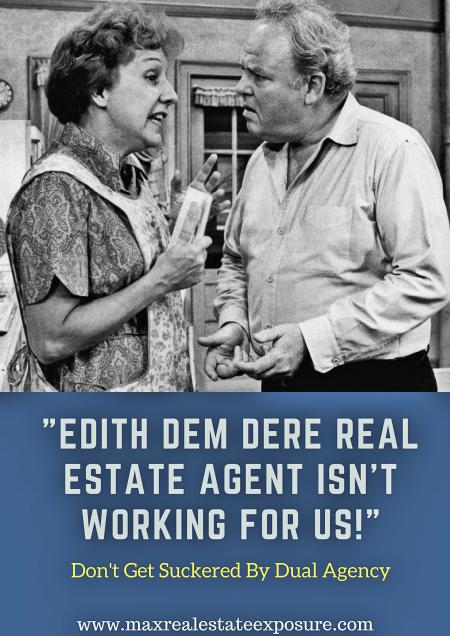Types of Real Estate Agents Explained In-depth
 Do you know the types of agency in real estate or the types of real estate agents?
Do you know the types of agency in real estate or the types of real estate agents?
How about who represents whom in a real estate transaction?
If you are shaking your head, NO, you’re not alone. Many people do not know the types of agency in real estate.
Agency law separates licensed real estate agents into three distinct categories. They are special agents, general agents, and universal agents.
If you have looked into buying or selling a home, you will quickly discover how many people are offering to help.
It can quickly become confusing as you try to understand who represents who, who is helping who, and where you fit into it all.
Whether buying or selling, you want to know that your best interests are represented by the person you choose to assist you.
Unfortunately, many consumers do not know who represents whom in a real estate transaction.
For this reason, I will educate you, so you’re better equipped to make intelligent decisions when involved in your next real estate transaction.
Types of Agency Relationships in Real Estate
Real estate agents tend to operate in three ways:
- Representing only you.
- Representing another party involved in your transaction.
- Representing both sides – the buyer and seller.
When you start communicating with a licensed Real Estate agent, you need to verify where their loyalties lie before you begin giving sensitive information – like how much you are willing to pay for a home.
You should also know that a real estate agent and Realtor® are different.
Let’s dive into the types of agency in real estate and how relationships impact buyers and sellers.
What is a Seller’s Agent?
Also called a listing agent, the seller’s agent works for the person selling the home. The agent will list the house, hence the name, and will work to find buyers and eventually sell the home.
When selling your home, you’ll likely sign a listing contract that spells out the relationship and terms you will agree to with the agent.
The homeowner typically pays the seller’s agent a commission based on the sales price.
If the seller’s agent finds buyers without an agent, they may send another agent from the same real estate firm to represent them. Or, the buyers may move forward with no representation.
In this circumstance, the buyer would be “working” with the seller’s real estate agent. The agent, however, would have complete allegiance to the seller in all aspects of the transaction.
A seller’s agent owes the seller undivided loyalty, reasonable care, obedience to lawful instruction, disclosure, confidentiality, and accountability.
A seller’s agent must put the seller’s interest first. They must negotiate the best price and terms acceptable to the seller. Many people wonder what does a listing agent do?
Look at the summary of what you should expect from an exceptional seller’s agent.
What is a Buyer’s Agent
The buyer’s agent works exclusively for the buyer, not for the seller. Buyer’s agents can be helpful for buyers who want to find the best home at the best price because the buyer’s agent has many resources that the average buyer does not.
Usually, the seller pays the buyer’s agent for their services, called a co-broke fee, but it is also possible that a buyer could pay a buyer’s agent in some circumstances.
The perfect example of when that could happen is if the buyer’s agent locates a for sale by owner property that is an ideal match for the buyer. Buying a for sale by owner without a real estate agent can be risky for various reasons.
In a buyer’s agency relationship, the agent owes the buyer undivided loyalty, reasonable care, obedience to lawful instruction, disclosure, confidentiality, and accountability. Like seller’s agency, the real estate agent must fight hard to negotiate the best price and other terms for the buyer.
Here is an explanation of what a buyer’s agent does for their clients.
An exceptional buyers agent will fight hard for their clients best interests.Click To TweetWhat is Dual Agency?
 Dual agency is a controversial arrangement made illegal in many states.
Dual agency is a controversial arrangement made illegal in many states.
The reason why dual agency is illegal in some states is straightforward – it is a horrible arrangement for buyers and sellers.
With dual agency, a real estate agent will represent both the buyer and the seller. Most states require that a written agreement be signed by all parties to ensure that the agent serves both parties’ best interests.
The problem with dual agency is that a single agent can’t serve both a buyer’s and a seller’s best interests.
The buyer wants to buy the home for as low a price as possible. The seller intends to sell the house for as high a price as possible.
These two goals conflict with one another, and the agent cannot seek both of them simultaneously.
The saying you cannot “serve two masters” speaks loudly.
Some states have rules that e agent cannot do anything that works against either client, which means that they cannot do anything for either party.
The agent becomes a neutral party or “just an order taker.” Neither the buyer nor seller is served well in a dual agency relationship because they cannot offer the respective services a buyer’s or seller’s agent would.
Avoid Dual Agency as a Buyer or Seller
Dual agency is a horrible arrangement for both sellers and buyers. If you are selling a home, one of the most significant factors in choosing a real estate agent is to get sound advice.
When you accept dual agency, you are giving that up. The agent you hired is no longer able to give you advice because it’s, in fact, ILLEGAL for them to do so.
One of the most significant issues with dual agency is that many real estate agents don’t know how it works. They are entirely in the dark about what they can and cannot do when taking on this role.
Another segment of agents knows precisely how dual agency works, but they want their clients to agree to it even though there is no benefit for THEM to do so. Why? The only person that benefits from dual agency is the real estate agent!
Most Consumers Wouldn’t Accept a Dual Agency Relationship if Explained Correctly
If buyers and sellers understand the dynamics of dual agency, they would never agree to allow it. Unfortunately, they do not understand, and the person explaining it to them is the agent who will benefit from their acceptance of it.
A real estate agent who tells you there is nothing wrong with dual agency is thinking about one thing – their respective wallet or purse! There is a reason there are more lawsuits against agents who practice dual agency.
The bottom line is you should always have an agent that is working for you and only you. Any real estate agent who doesn’t take the time to explain agency law properly deserves to be fired!
Dual agency benefits only one person - the real estate agent. Avoid it!Click To TweetWhat is a Designated Agency?
 Many real estate firms work with both buyers and sellers. To ensure that both parties are served as well as possible, these firms will designate an agent to work for the buyer and an agent to work for the seller.
Many real estate firms work with both buyers and sellers. To ensure that both parties are served as well as possible, these firms will designate an agent to work for the buyer and an agent to work for the seller.
These designated agents serve in the same capacity as buyer and seller agents, working exclusively for their specific client’s interests. Only your designated agent works for your best interests.
What can be confusing is the fact that some states call dual agency and designated agency the same thing.
For example, in California, when two agents from the same office represent a buyer and seller, they call this dual agency.
You must understand that single-agent dual agency and designated agency are like night and day.
The real estate agent is accountable to nobody in a single-agent dual agency. In a designated agency, both the buyer and seller have representation.
Like in the seller’s and buyer’s agency, each agent provides their respective client with undivided loyalty, reasonable care, obedience to lawful instruction, disclosure, confidentiality, and accountability.
Besides the fact that some states call dual agency and designated agency synonymous terms, they are very different. This is why it is vital to understand agency law in your state. See dual agency vs. designated agency.
In a designated agency arrangement, the commission the seller pays to their agent is shared by both agents.
What is Sub-Agency?
Some states allow agents to work for seller’s agents as sub-agents. These sub-agents are paid out of the commission paid to the seller’s agent.
If you find a home you are interested in and call an agent, a real estate agency, or some other party, you will most likely be interacting with a seller’s agent. Sometimes you may interact with a subagent working for a seller’s agent.
Just because someone offers to show you a home for sale does not mean you are meeting with a buyer’s agent. It would be best to clarify who the agent represents before you start communicating seriously.
You do not want to give away any information that would compromise your ability to get the price you want for the home.
Operating under the assumption that an agent works for you makes you more vulnerable to persuasion that may not benefit you.
What is a Facilitator, Non-agency or Transaction Brokerage
There are some situations where you may encounter agents that are not working for the buyer or the seller but are still facilitating the transaction somehow.
Suppose the agent is facilitating your transaction but not representing you as an agent. In that case, they are free from the legal obligations that a buyer’s or seller’s agent would have.
The facilitator is usually expected to treat you respectably but would not have any obligation to keep confidence with only you. When working with a facilitator, they will assist in reaching an agreement.
The facilitator and the broker with whom they are affiliated owe the seller and buyer the ability to represent the property honestly and accurately by disclosing all property defects. They must also account for any escrow funds.
In many states, unless otherwise agreed, a facilitator has no obligation to keep information obtained by a buyer or seller confidential. Florida is the most well-known transaction brokerage state.
Protecting Your Best Interests With Representation
 Before you ever start working with a real estate agent, ask about the type of agency you’ll agree to.
Before you ever start working with a real estate agent, ask about the type of agency you’ll agree to.
Most states require disclosure of representation at the first meeting with a consumer.
You have a right to inquire whether the agent is a buyer’s agent, seller’s agent, or some other agent, and you want to know their allegiances.
It is essential to distinguish between a listing agent and a selling agent.
You should also understand when hiring an agent that there are skill differences between seller and buyer agents.
Some agents are excellent at working with sellers. Some are just as good at working with buyers. Don’t assume every agent has the same skill set.
Hiring an agent who does most of their business working with sellers might make sense if you sell a home.
Undoubtedly, many people make the mistake of hiring the wrong real estate agent.
In many states, including Massachusetts, a real estate agent must explain how an agency works. A form that buyers and sellers must sign is called an agency disclosure form.
The agency disclosure forms spell out each type of agency. The buyer or seller should sign this form acknowledging two things – who the agent is working for and how agency law works.
The form’s whole point is to prevent either a buyer or seller from not understanding who represents whom.
Your transaction is a significant life decision and financial transaction, so you want to be sure you are working with someone who will protect your specific interests.
What is Special Agency in Real Estate?
You may hear the term “special agency in real estate” or “special agent.” Clients entrust real estate special agents with a singular task, typically finding a buyer or seller for their property.
Special agents’ authority is confined to this role, and once completed, both parties are discharged from liability obligations, thus enabling the arrangement to be concluded expeditiously.
The majority of all licensed agents are special agents. Special agency is one of the most common real estate agency types.
See an overview of everything a real estate agent does for buyers and sellers.
What is a General Agency in Real Estate?
Like it sounds, a general real estate agent performs many associated industry tasks. They are real estate professionals who assume responsibility for all aspects of a given job and fulfilling it on an ongoing basis.
Property managers are a prime example of this form of agency. Quite often, general real estate agents are brokers who oversee an entire brokerage of agents.
What is Universal Agency in Real Estate?
A universal agent has the authority under power of attorney to provide real estate assistance to clients on their behalf.
The universal agency is the most potent form of agency with the broadest definition of the services an agent can perform.
A universal agent in real estate has unwavering authority to make impactful decisions.
The agent holds the power to bind their principal in contracts and take actions on their behalf, within the limits of what has been placed upon them.
An example of a universal agent would be someone appointed by a court to manage a client’s affairs. The client could be incapacitated or unable mentally to make significant decisions. So, the universal agent does it for them.
What is Implied Agency in Real Estate?
As it sounds, an implied contract in real estate is not written between an agent and a client. Instead, there is a mutual understanding. It exists based on actions taken by the parties involved.
Implied contracts have a similar legal potency as the express contract that parties enter voluntarily or by agreement in writing.
Yet, there is no need for additional written confirmation of an implied connection – such connections will arise naturally and without compulsion.
The relationship between a client and a real estate agent defines the implied agency. For example, a seller’s agent is trying to sell the client’s property. There is an existing relationship even though the parties have not signed a formal contract.
The real estate agent works in the client’s best interests in an implied agency relationship. The agent must disclose any information that would empower the client to make the best decisions.
What is a Limited Agent in Real Estate?
A limited agent or “limited agency” is the same as dual agency. With written consent, the real estate broker represents both the buyer and seller in the transaction.
Representing is technically not possible even though it is used to describe the situation.
The term “limited” is used because the broker cannot perform the same services as they would as a respective buyer’s or seller’s agent. Hence their capacity to perform traditional real estate service is limited.
A limited agent does not serve a buyer or seller’s interests well.
Final Thoughts on Real Estate Representation
As you can see, there are several types of real estate agents. Understanding the type of agency you’ll be agreeing to in a real estate deal is essential.
Generally speaking, if you are a buyer, you want a buyer’s agent. If you are a seller, you want a seller’s agent. Designated agencies can work to your benefit in most situations, and you may be forced to deal with a sub-agent at some point.
However, try to avoid dual agency arrangements, and remember that a facilitator has no obligation to you.
Above all else, when buying or selling a home, ensure you understand how agency relationships work in your respective state.
Hopefully, you now have a better understanding of how agency laws work. It would help if you never were unsure who represents whom in a real estate transaction. If you have doubts, there is a problem.
Additional Helpful Home Buying and Selling Articles
- Should I have my own agent when buying a new home – see why having your exclusive agent makes the most sense whether you are buying or selling a home by Kyle Hiscock.
- Make sure your agents are looking for past issues – one of the most important aspects of representing a client well is doing due diligence. See what you need to know via Anita Clark.
Use these additional articles to make sound decisions when buying or selling a home. Above all else, have a top real estate agent representing your interests!
About the author: The above Real Estate information on types of agency in real estate was provided by Bill Gassett, a Nationally recognized leader in his field. Bill can be reached via email at billgassett@remaxexec.com or by phone at 508-625-0191. Bill has helped people move in and out of many Metrowest towns for the last 37+ Years.
Are you thinking of selling your home? I am passionate about real estate and love sharing my marketing expertise!
I service Real Estate Sales in the following Metrowest MA towns: Ashland, Bellingham, Douglas, Framingham, Franklin, Grafton, Holliston, Hopkinton, Hopedale, Medway, Mendon, Milford, Millbury, Millville, Northborough, Northbridge, Shrewsbury, Southborough, Sutton, Wayland, Westborough, Whitinsville, Worcester, Upton, and Uxbridge MA.

